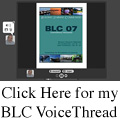I can not take credit for this title. It is from the students in my class who are feverishly trying to get a piece ready for this week’s Podcast that will focus on the latest Wikipedia saga…
I have shared Wikipedia with my students many times this year. I have told them both sides of the argument for and against such an online tool. I continuously play “devil’s advocate” with them in order to get them thinking/talking/arguing about this debate that crops up at every teachers’ conference I’ve been to in the past year:
Is Wikipedia BAD?
I am so thankful for the Seigenthaler controversy because of the new level of discussion happening in my 3/4 grade classroom (however, my heart does go out to Mr. Seigenthaler, and even Mr. Chase who lost his job over such poor judgement).
You see, my students don’t know which side to take! In one moment, they think that it is unforgivable for what happened to Seigenthaler to be allowed to happen on the Internet, and in the next moment, they say that it is “not Wikipedia’s fault”, but the responsibility of the perpetrator. I asked them if anything was “hurt” by this incident, or “damaged“. One of my 3rd graders’ response was:
“Yes. Wikipedia’s reputation was damaged.”
This was from a third grade student!
David Warlick talks about the need to teach Ethical Uses of the Internet as one of the “4 E’s” of teaching the “New Literacy for the 21st Century”. My students are already understanding what Mr. Chase did not. Several students in the class say that what he did is just like “writing on the walls in the bathroom.”
We need to have these discussions with our kids and this current opportunity is not to be missed.
For awhile, I’ve seen the Wikipedia debate as representational of what is holding us “digital immigrants” back. Wikipedia is not going away. When we ask the question, “Should we let our students use it?” because things could be inaccurate, I think we’re missing the point. The question should be, “How do we prepare our students to use these 21st Century tools?” (blogs, podcasts, wikis) as well as, “How do we teach our students that to be a responsible 21st Century citizen includes not vandalizing the Internet?”
At the Warlick conference I went to earlier this year, he talked about how we should ask guests visiting our schools how they use the Internet, and what would happen if someone interrupted that use. For instance, when the Firefighter comes to visit an elementary school, we should ask them to share how important the communication systems are and what would happen without it. We need to help students make the connection that real vandalism to the structures have real effect in a real world.
I think it was Marc Prensky who said in his talk that one difference between the “digital natives” and the “digital immigrants” is that the “digital immigrants” still see what happens on our computers as separate from the rest of our “real lives” that we live in. Obviously this was the case with Mr. Chase.
We can only thank him for making this blunder so that our kids don’t have to.





2 responses so far ↓
1 Cheryl // Dec 16, 2005 at 3:17 pm
You and your students are constantly “pushing the envelope”. I wonder if they know what that phrase means. It would be a good thing to research. I am excited by the image of your students debating the issues of 21st Century Skills. They get it! They live it! They will no longer travel in the slow lane of the World Wide Web. The Information Highway is wide open and they are passing many digital immigrants. I want to be traveling with the Digital Natives, here is my ticket.
2 Matt // Dec 18, 2005 at 8:02 pm
I too have my seventh graders use Wikipedia as a source of information. As with any source, I ask them to test the validity of the source by checking it against others. Although Wikipedia has suffered a bit of an credibility problem, I think it stacks up pretty well against the traditional founts of information like Britannica. Nature magazine did a side-by-side comparison of the science articles in both encyclopedias, and Wikipedia was comparable in terms of accuracy. And I don’t think many sources can challenge Wikipedia in terms of the breadth of topics. All said, I think it is a resource our students need to be familiar with in terms of its strengths and shortcomings.
Leave a Comment